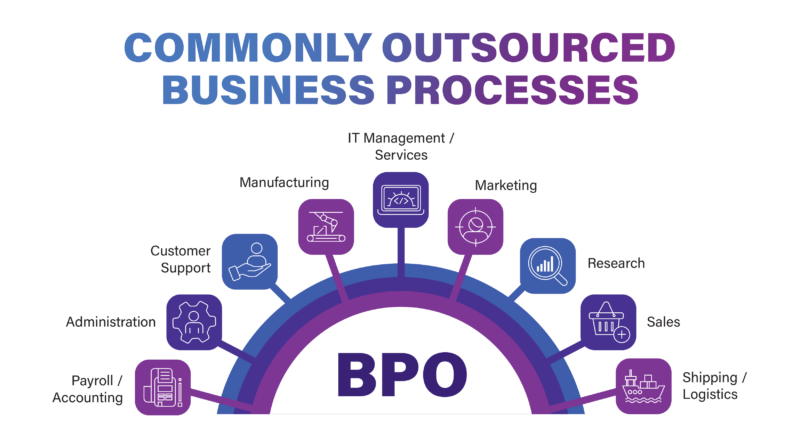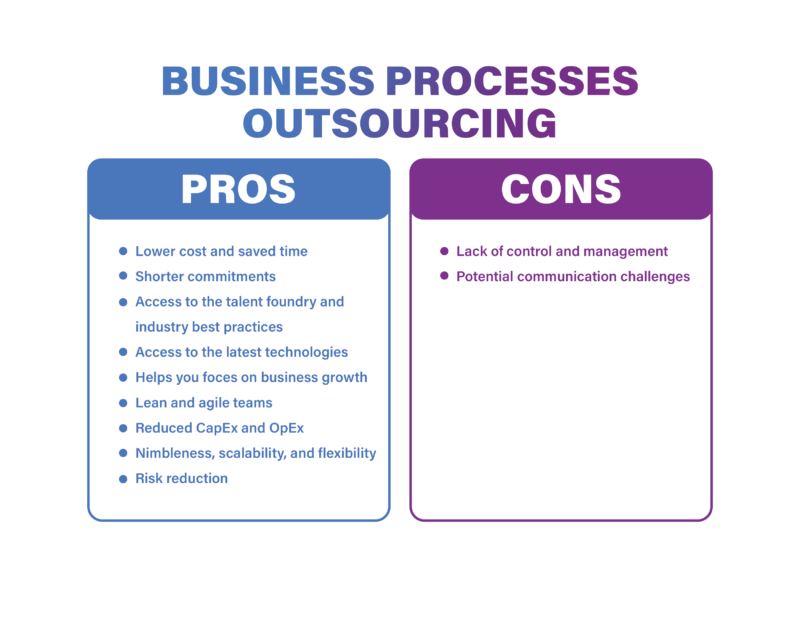As the pace of global business accelerates, an increasing number of top-tier executives recognize the strategic role of Business Process Outsourcing (BPO) in improving operational efficiency and catalyzing business growth. However, the concept of BPO often remains shrouded in misconceptions and underutilized potential. This article aims to decode BPO and elucidate how its effective application can drive significant value to your business.
BPO, in essence, refers to delegating one or more non-core business activities to an external agency, freeing up your organization’s resources to concentrate on core competencies and strategic objectives. Some common areas of BPO include customer service, human resources, IT services, and accounting.

But the question persists: how can BPO drive value to your business? The following sections delve into this question, outlining the transformative potentials of BPO from a strategic, financial, and operational viewpoint.
1. Strategic Value: Enhancing Core Focus and Agility
The paradigm of business process outsourcing services paves the way for businesses to realign their focus towards vital core activities strategically. It offers an opportunity to delegate operations that do not form the crux of their unique business proposition to external service providers. This strategic initiative enables organizations to commit their human, financial, and time resources more effectively and efficiently toward sectors that bolster their competitive edge in the marketplace.
In outsourcing these non-core functions, companies can enhance their key capabilities, refine their core competencies, and foster innovation in areas that directly impact their market standing and business growth. This reorientation towards their main business activities engenders a profound focus and dedication towards core tasks and objectives.
Furthermore, the BPO model enhances corporate agility, a critical trait in modern business. In our era of rapid technological advancements and swiftly evolving market dynamics, businesses must be nimble and quick to adapt. The enhanced agility achieved through BPO empowers companies to respond promptly to ever-changing market trends and customer demands.
With their attention not divided by routine tasks and administrative functions, executives are better equipped to steer the company swiftly and effectively through the choppy waters of a rapidly shifting business landscape. Therefore, integrating BPO is a heightened focus on core competencies and a significant improvement in the organization’s ability to adapt and thrive amid business flux, a prerequisite in today’s fast-paced, unpredictable business environment.
2. Financial Value: Cost Reduction and Resource Optimization
Economic efficiency, frequently epitomized by cost reduction, is arguably the most universally acknowledged advantage of adopting BPO. This benefit stems from the ability of organizations to capitalize on the specialized knowledge and skills offered by outsourcing providers. The BPO model facilitates considerable expenditure savings, primarily attributable to the benefits derived from economies of scale and improvements in process efficiencies.
Specialized BPO providers are designed to operate at large scales, allowing for cost distribution over a wider base, thereby decreasing the per-unit cost of services. This leads to economies of scale, a key driver of cost savings. Furthermore, these providers have honed their processes to achieve optimal efficiency, often harnessing the latest technology and methodologies to streamline operations further, leading to additional cost reductions.
However, the advantages of BPO extend well beyond the scope of mere cost savings. It acts as a powerful tool for resource optimization across the organization. The financial resources conserved by outsourcing non-core operations can be reallocated and channeled toward the execution of strategic growth initiatives. These might include research and development, market expansion, technological innovation, or talent acquisition and development.
3. Operational Value: Boosting Efficiency and Quality
The delegation of tasks to proficient BPO services providers implies that the operations not fundamental to your business can be conducted with heightened efficiency and superior quality. One of the significant advantages of outsourcing is that BPO providers are specialized entities. Their entire business model revolves around delivering high-quality services in their specific areas of expertise.
These outsourcing firms are often equipped with state-of-the-art technology, sophisticated systems, and a workforce that is skilled and specially trained to deliver premier performance in their respective fields. Their business focus allows them to invest in and adopt advanced technologies and innovative processes that may be beyond the reach of companies whose core competencies lie elsewhere. Their strong operational infrastructure and dedicated personnel ensure the seamless and effective execution of tasks.
This expertise and specialization notably enhance your organization’s operational efficiency. Tasks are completed more swiftly, accurately, and reliably, resulting in higher service quality. This is not just about maintaining an effective operation; it’s about setting a new standard of excellence within the industry.
4. Innovation: Fueling Digital Transformation

These BPO providers can foster and bolster innovation, implementing technologically advanced processes and systems that might be overly resource-intensive or technologically challenging for companies to develop and manage in-house. This extends to numerous facets of business operations, including supply chain management, where AI and ML can streamline logistics, optimize inventory, and predict demand, and knowledge process outsourcing, where expertise in specific knowledge areas is harnessed for data analysis, research, and decision-making.
By partnering with BPO providers, companies can integrate these advanced technologies and methodologies into their operations, redefining their managing business processes and driving efficiency, accuracy, and agility.
However, for organizations to truly harness the transformative potential of BPO, C-suite executives must shift their perspective of BPO from being a mere cost-minimizing instrument to a strategic catalyst for business growth and transformation. It requires a holistic and strategic viewpoint that recognizes the multiple benefits BPO can deliver.
This paradigm shift towards viewing BPO as a strategic growth enabler involves several key steps. Firstly, choosing the right outsourcing partner is vital – a partner whose capabilities align with your business goals and who demonstrates the technological prowess and operational expertise to deliver high-quality services.
5. Scalability: Adapting to Changing Business Needs
A cornerstone advantage of Business Process Outsourcing (BPO) is the remarkable degree of flexibility and scalability it presents to organizations. In the grand chessboard of commerce, businesses are inherently dynamic entities, constantly oscillating with varying needs and demands shaped by market conditions, business cycles, customer expectations, and technological advancements.
The BPO industry is a strategic partner in this fast-paced, ever-changing environment, offering an agile model that can swiftly respond to these fluxes. The business process management systems of BPO providers are designed to easily scale services up or down in response to your evolving requirements. This unique scalability is a vital asset for businesses navigating the highs and lows of their operational lifecycle.
Consider a scenario where your organization is entering a high-growth phase, perhaps venturing into uncharted markets or launching new products. In such circumstances, the need for bolstered support services, like customer or technical support, may surge. Your BPO partner, leveraging their expertise and resources, can rapidly ramp up these services to align with your burgeoning needs, often employing advanced tools like robotic process automation for efficiency and accuracy.
Contrastingly, in periods of slower business cycles or economic downturns, there’s a real need to contain costs and streamline operations. Here again, BPO offers a cushion, enabling you to scale down services without the typical headaches of layoffs or asset disposals. This ability to seamlessly adjust operations in response to business needs is a testament to the inherent flexibility of the outsourcing industry.
Offshore outsourcing can further enhance this scalability by providing access to global talent pools and enabling round-the-clock operations. It allows organizations to delegate non-core business functions to offshore partners while concentrating on driving innovation and excellence in their core competencies.
This elasticity intrinsic to BPO provides a powerful lever for C-suite executives to manage business uncertainties effectively. It allows them to swiftly adapt to changes, whether a sudden market opportunity or an unforeseen disruption, ensuring business continuity and resilience. By integrating BPO into their strategic arsenal, executives can foster a more agile, responsive, and resilient organization equipped to thrive in the dynamic business world.
6. Risk Mitigation: Spreading the Liabilities
An additional dimension where the transformative potential of BPO call centers emerges prominently is within the risk management domain. By entrusting your non-core operations to a BPO provider, the inherent risks associated with these operations are distributed and shared with your partner, thus effectively dispersing your organization’s operational risks.
This risk distribution aspect of outsourcing is a strategic move that provides a certain degree of insulation against uncertainties and potential disruptions. BPO providers, by their role and specializations, are often better prepared and equipped to foresee, understand, and manage potential risks that could arise during business operations.
Their expertise is industry-specific, enabling them to stay ahead of the curve concerning potential challenges such as shifts in regulatory landscapes, operational disruptions, and technological obsolescence. Their business model is constructed around the ability to adapt to these changes swiftly, and their specialized knowledge equips them to anticipate these risks and devise appropriate mitigation strategies.
7. Global Expansion: Accessing New Markets and Talent Pools
BPO can be a strategic springboard for organizations contemplating international expansion and aspiring to amplify their global footprint. A distinguishing characteristic of many BPO providers is their extensive international presence and a profound understanding of various local business landscapes derived from their multi-geographical operations and diverse client base.
By forging partnerships with these global BPO providers, organizations can tap into this treasure trove of market intelligence. They can garner valuable insights into new markets, understanding market dynamics, customer preferences, cultural nuances, and competitive landscapes. This knowledge can significantly aid their market entry strategies and adaptation of their offerings to local tastes and preferences.
Moreover, these BPO partners can provide critical support in navigating the complex maze of local regulations, tax structures, and legal considerations. They can ensure compliance with the local regulatory framework, mitigating potential risks and hurdles in the new market.
Additionally, the global nature of BPO provides an opportunity to deliver customer services in multiple languages. This is particularly vital in today’s customer-centric business environment, where personalized, localized services can significantly enhance the customer experience and foster customer loyalty.
A further compelling advantage of BPO in the context of global expansion is the access it provides to international talent pools. This access is not limited to outsourcing routine tasks; it includes acquiring diverse skill sets, cultural competencies, and innovative perspectives that could significantly enhance your business’s operations and competitiveness. The infusion of this fresh talent and ideas can spur creativity and innovation within the organization, driving business growth.
The potential of BPO extends far beyond simple operational efficiency. From a C-suite perspective, the true value of BPO lies in its ability to drive strategic focus, financial performance, operational efficiency, and digital innovation. By decoding and leveraging the power of BPO, executives can unlock new avenues of growth and ensure their organizations remain agile and competitive in the dynamic global business landscape.



Leave A Comment
You must be logged in to post a comment.